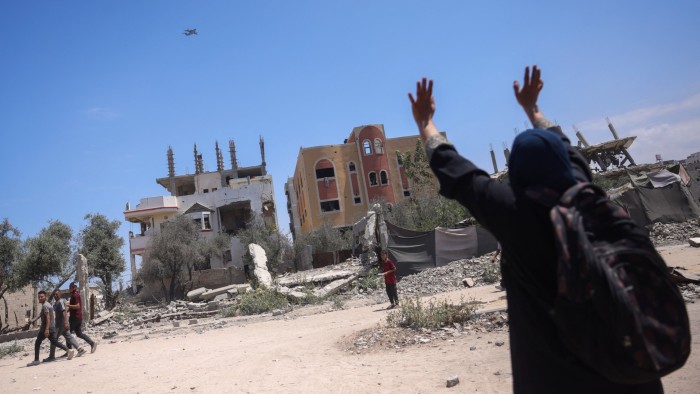Unlock the Editor’s Digest for free
Roula Khalaf, Editor of the FT, selects her favourite stories in this weekly newsletter.
Benjamin Netanyahu is expected to seek approval for Israel to fully occupy the Gaza Strip, raising the prospect of an offensive stretching for several months with open-ended Israeli control of the besieged Palestinian enclave.
The proposal, to be presented on Thursday to the security cabinet and which has been heavily briefed to the Israeli media, is a potential gambit to simultaneously pressure Hamas to cave to its demands over a hostage swap while placating far-right ministers in the Israeli coalition.
But the planning also paves the way for Israel potentially taking over the Palestinian enclave for the second time since the 1967 war, leaving the nation in effective control of all the territories between the Jordan River and the Mediterranean Sea.
It would involve Israeli forces taking over the densely populated parts of Gaza not under their control, mostly around the ruins of Gaza City, and force Palestinian civilians into already crowded tent cities along the southern coast, according to several Israeli reports.
Doing so would require several more months of fighting and a substantial call-up of reserves, the reports said, and would trigger significant international condemnation.
It would also further endanger the lives of Palestinian civilians who have been forced out of nearly 90 per cent of Gaza, and are in the grip of a rapidly unfolding famine.
The families of the 50 hostages still held by Hamas — including 20 still believed to be alive — are also bitterly opposed, convinced that an expanded military offensive would endanger the lives of their loved ones.
Two Israeli officials confirmed the reports, but said the proposal was one of several presented to Netanyahu by the Israeli military, which is divided over the options.
The proposal carries a heavy historical weight and humanitarian burden — returning the Israeli military as the administrator of Gaza exactly 20 years after it withdrew from the territory, and thus, legally responsible for more than 2mn Palestinian civilians in the grip of humanitarian disaster.
Netanyahu is said to have agreed to a phased military offensive, delaying the formal declaration of occupation of the territory until a later date, one of the Israeli officials said.
As an occupying power, Israel would have greater legal responsibilities for the needs of Palestinian civilians. It would be required, for instance, to directly provide humanitarian assistance, rather than just facilitating its passage into a besieged war zone.
But it would also provide Israel with the legal mechanism to confiscate Palestinian land and use it for Jewish settlement, as it did between 1967, when it wrested the territory from Egyptian control, and 2005, when Prime Minister Ariel Sharon ordered the dismantlement of 21 Israeli settlements and the forced removal of 8,000 Jews.
Resettling Gaza is a core demand of the far-right ministers who prop up Netanyahu’s government. US President Donald Trump told reporters earlier this week that any decision to reoccupy Gaza “was pretty much up to Israel”.
Mike Huckabee, the US ambassador to Israel, told Fox News that a US-backed and Israeli-approved foundation would expand operations to transport food into Gaza, despite widespread international condemnation of the militarised project.
More than 1,000 Palestinians have been killed by live fire near the foundation’s four distribution sites, local health officials say.
The 22-month war was triggered by an October 7, 2023 cross-border raid by Hamas that saw 250 people taken hostage and 1,200 killed in Israel, according to local officials.
Israel’s military offensive has killed at least 60,000 Palestinians, mostly women and children, according to local health officials, and devastated the civilian infrastructure of the enclave.
#Benjamin #Netanyahu #present #plan #full #occupation #Gaza


